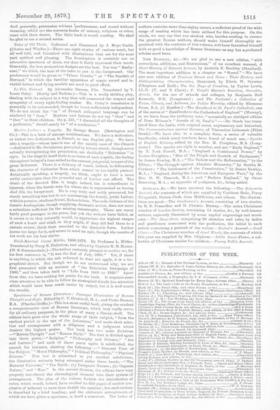Martin Luther : a Tragedy. By George Moore. (Remington and
fo.)'—This is a book of strange combinations. We have a dedication, or rather two dedications, in French, to one English play. We have also a tragedy—whose hero is one of the saintly ones of the Church —dedicated to Mr. Swinhurne, preceded by letters which, though never actually transgressing the proprieties, are decidedly " Bohemian " in style. In the tragedy itself there is no trace of such a spirit, the feeling throughout being of a tone suited to the earnest, yet genial, temper of the great Reformer. There is a delicacy of touch, indeed, in delineating the character of Cathariee Bora which cannot be too highly praised. Artistically speaking, a tragedy, we think, ought to have a more awful catastrophe than the peaceful end of Luther can afford. The death of the devoted Elsa is tragic indeed, but is subordinate in interest, when the heroic man for whom she is represented as having died fills the foreground. Ile is very truly and nobly presented, but surely something was lost in not contrasting the hearty, jovial Luther, with his pensive, studious friend, Melanchthon. The rude violence of the fanatic Anabaptists, though supplying dramatic action, does not seem a substitute sufficient for the missing catastrophe. There are many but yet the writers have failed, as fairly good passages in the poem, it seems to us they naturally would, to appreciate the highest ranges of such a heart and mind, or they might, if they did feel them to a certain extent, think them unsuited to the dramatic form. Luther looms too large for it, and seems to need an epic, though the results of his work are his best shrine.


































 Previous page
Previous page